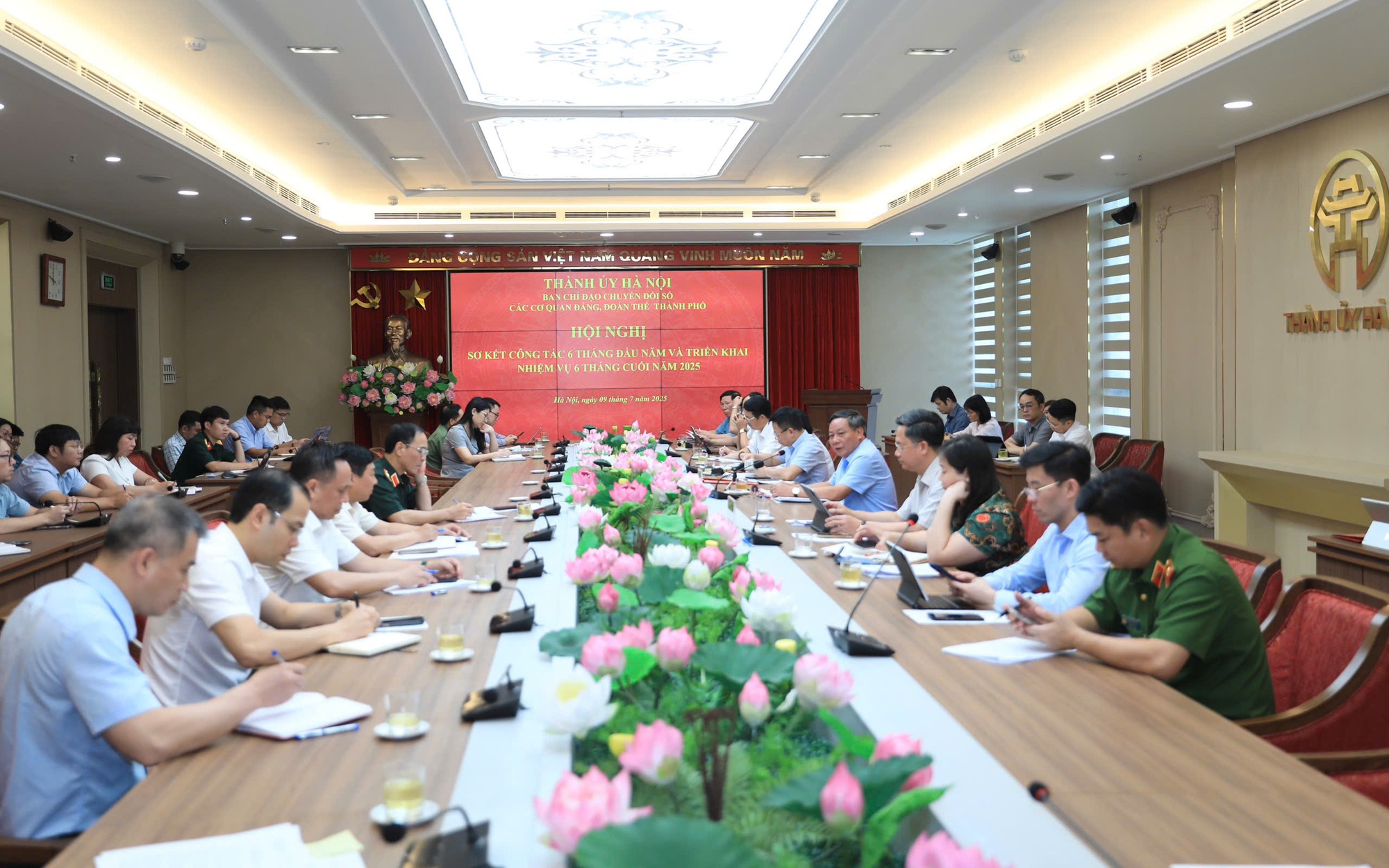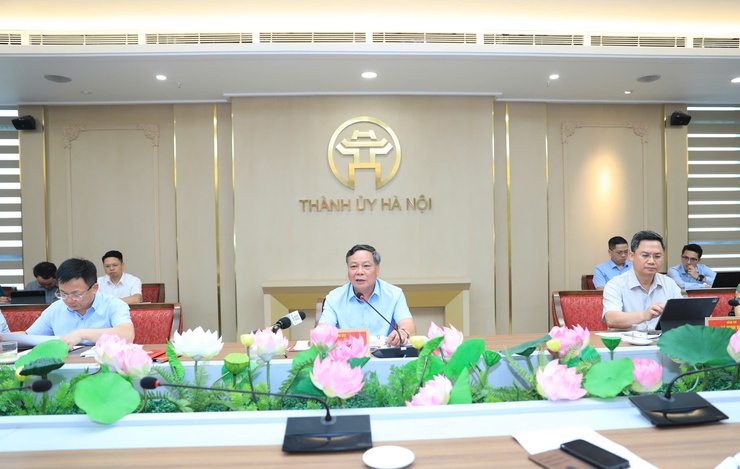Nguyen Van Phong, Permanent Deputy Secretary of the Hanoi Party Committee and Head of Steering Committee 204, chaired a conference on July 9 to review digital transformation efforts in Party and mass organizations in the first half of 2025.
Also attending were Ha Minh Hai, Head of the Organization Commission and member of the Hanoi Party Committee’s Standing Committee, along with other members of the Steering Committee.
At the beginning of 2025, Steering Committee 204 held its first meeting to approve working regulations, assign specific responsibilities to each member, and develop an implementation plan for the digital transformation initiative in Party and mass organizations across the city.

Overview of the meeting.
A key highlight of the first half of the year was the restructuring of operational procedures. The Hanoi Party Committee directed Party-affiliated departments, its Office, and subordinate units to review and improve administrative and Party-related procedures. These were then proposed for revision and integration into the National Public Service Portal.
Hanoi became the first locality to develop and integrate four Party administrative procedures into the National Public Service Portal. These included payment and collection of Party membership fees; collection of feedback from local Party cells on members residing in their area; official transfers of Party membership; and temporary transfers.
In June 2025, the Hanoi Party Committee began piloting these procedures across Party organizations with access to the National Public Service Portal.
After nearly one month of operation, by June 24, 2025, the system recorded over 1.2 million visits from all 63 provinces and cities and 27 countries. It registered 40,974 Party member accounts, 10,120 Party fee payment transactions, 44 requests for residential area feedback, 22 official Party membership transfers, and 8 temporary transfers.
These digitalized procedures have been highly appreciated by Party organizations and members for their efficiency, cost savings, and transparency. Specifically, the feedback collection process is estimated to save Hanoi approximately US$9.8 million per year.

Hanoi Vice Party Chief Nguyen Van Phong.
In parallel, the Hanoi Party Committee focused on developing digital infrastructure and ensuring stable operation of key information technology systems, including the dedicated data network and video conferencing systems connecting the central government with local levels.
Two continuously operating data centers have been established to ensure cybersecurity and provide technical support. As of June 10, 2,157 agencies and 4,682 individual accounts were using the document and workflow management system.
This included 2,125 outgoing documents, 36,132 incoming documents, 935 organizational digital signatures, and 1,957 individual digital signatures. The virtual assistant system, designed to answer questions about Party documents, had responded to 8,381 inquiries, recorded 1,004 conversations, and processed 2,479 messages.
Efforts to digitize Party records and documents were also ramped up. The creation of a centralized digital archive is seen as a critical foundation for expanding digital applications, improving management and operations, and laying the groundwork for a digital and electronic government model.
Despite positive outcomes, Hanoi's digital transformation process in Party and mass organizations continues to face significant challenges, such as inconsistent infrastructure, limited human resources, and insufficient investment capital.
At the conference, participants reported on upcoming plans to organize Party member databases, digitize documents, and assess the current state of shared infrastructure in communes and wards. The goal is to ensure wide-band connectivity, high-speed internet access, and smooth performance of end-user devices.
In his remarks, Deputy Secretary Nguyen Van Phong acknowledged the efforts of various departments and agencies but emphasized that the current results do not yet match Hanoi's potential or its position as the capital.
He noted that following the administrative restructuring into a two-tier model with 126 newly designated communes and wards, a lack of urgency could hinder the city's digital transformation.
To bring about real progress, he called for a candid assessment of both accomplishments and shortcomings, and a clear understanding of Hanoi's current standing in the national digital transformation rankings.
He stressed the need to avoid developing standalone software systems and instead adopt a unified platform for all operations. The Department of Science and Technology, in coordination with relevant agencies, was tasked with completing the integration of Hanoi's operational software into the national system.
The Deputy Secretary also instructed agencies to review and redesign their work plans for the second half of the year in a scientific and realistic manner. He emphasized that document archiving and digitization must be treated as urgent tasks, especially for newly restructured administrative units.
He also announced the establishment of an expert group to advise the Steering Committee and a restructuring of the support team to ensure greater efficiency. These actions reflect the Party Committee's determination to make a breakthrough in digital transformation, in line with Hanoi's role as the nation's political and administrative center.
From now until the end of the year, the top priority is to accelerate internal digital transformation within each agency and to strengthen training and support at the grassroots level. Investment will be prioritized for infrastructure and the completion of online meeting systems.
The Deputy Secretary emphasized that each agency must undergo a fundamental shift in digital transformation awareness. Every leader and department head must become a core driver of innovation, a source of inspiration, and a guiding force behind digital transformation efforts in their units, contributing to the city's overall success.